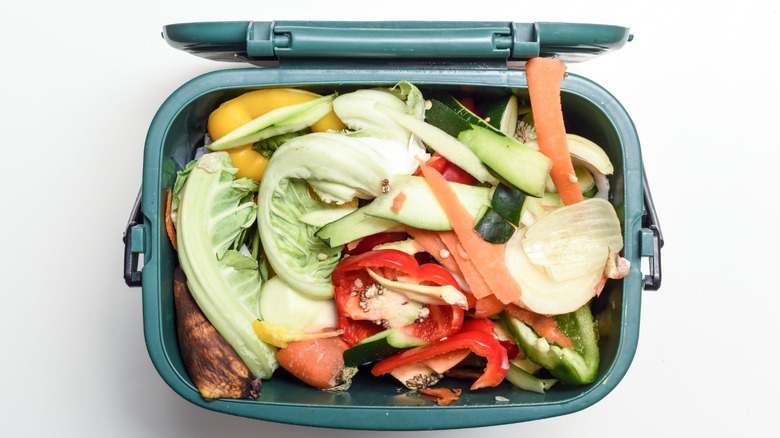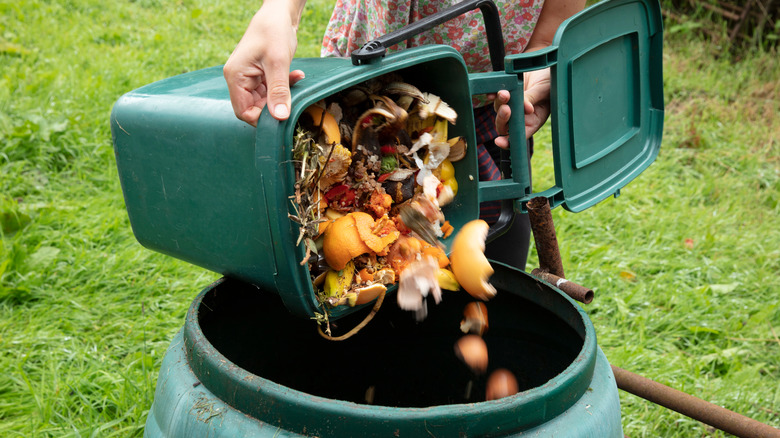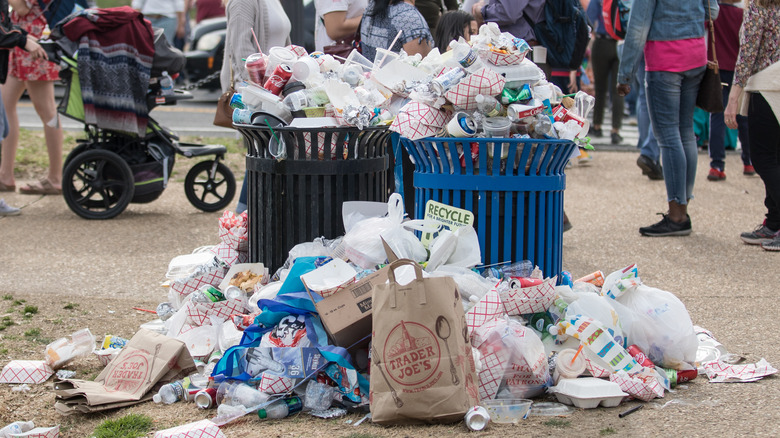Why California Took A Huge Stand Against Food Waste
When we were growing up, our parents likely told us not to waste food, and to eat every bit on our plate so nothing would get thrown away. But even when we eat all our food, chances are we're leaving some kind of food waste on our plates, be it banana peels or indigestible chicken bones.
Now the state of California says it may have a solution for all that food waste, and it could turn out to be a significant weapon in the fight against climate change. At the start of 2022 — which is in just a few weeks — all California households will be required to toss all inedible food scraps or leftover fruits and vegetables past their "best by" dates into green garbage cans, instead of into the regular trash, The Guardian reports.
And lest you think the scraps are going to end up in the same landfill pile anyway, the state wants everyone to know it's got plans for all the scraps its citizens have no intention of consuming. As the University of California, Davis' Ned Spang, who is faculty lead for the school's Food Loss and Waste Collaborative, puts it, "There's just no reason to stick this material in a landfill, it just happens to be cheap and easy to do so."
Not everyone is ready for the new law
Once household food waste is picked up from the residence that generated it, municipalities are then required to take that waste and either turn it into compost or create biogas with it, according to The Guardian. What each city or municipality does with their organic waste depends entirely on what steps it might have taken to get ready for this moment.
There are more than 480 villages, towns, and cities in California, and Recycle Nation says each district will be handling their food waste in a different way. Areas that had a head start in getting their food recycling programs off the ground, like Costa Mesa or Long Beach, already have systems in place that take food scraps to a materials recovery facility, which then turns the scraps into renewable energy like biogas. Some will accept cooking oils and fats, but others won't. And still other regions, like San Diego and Los Angeles, which still have some way to go in getting their food recycling programs off the ground, will need to rely on programs like "Curb Your Food Waste" — which encourages people to stop buying too much so less items need to be disposed of.
Adapting to this new initiative has been more challenging for some areas of the state than others. The city of San Diego, for instance, has had to budget an extra $9 million to provide its citizens with special green bins and kitchen counter containers meant for organic waste (via Fox 11).
'No downside to the program'
Curbing food waste in this way might seem like a lot of effort, but the state's Department of Resources Recycling and Recovery (CalRecycle) has data that shows it's worth it. It says organic waste like food scraps and yard trimmings actually make up 50% of what California residents throw into their landfills. Because of that, the state's landfills actually end up generating 20% of the state's methane levels. This gas is 84 times stronger and more destructive than carbon dioxide. "If the average household of four people or so diverted all of their organic waste it'd be like taking their car off the road for almost a year," CalRecycle director Rachel Wagoner told ABC7.
Wagoner also says there is no downside to the program which, when enacted, will be "the biggest change to trash since recycling started in the 1980s,". She even points out that composting "helps with water conservation, it cuts back on the need for pesticides and fertilizers and is really something that helps our future food and plants grow."
CalRecycle is fully prepared to begin enforcing the law on January 1, 2022, but it's also allowing municipalities and jurisdictions to push back their deadlines by submitting what is known as a "notification of intent to comply" by March 1. This means certain areas will be given an extra few months to ensure they are properly equipped to enforce the law.


